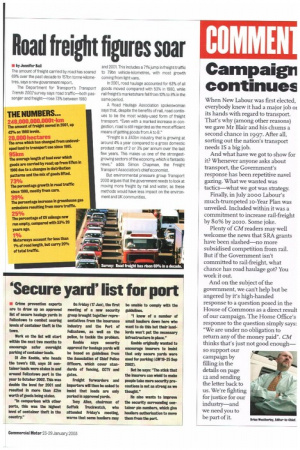`Secure yard' list for port
Page 9

If you've noticed an error in this article please click here to report it so we can fix it.
• Crime prevention experts are to draw up an approved list of secure haulage yards in Felixstowe to combat soaring levels of container theft in the town.
Work on the list will start within the next two months to encourage safer overnight parking of container loads.
DI Jim Keeble, who heads the town's CID, says 38 container loads were stolen in and around Felixstowe port in the year to October 2002. This was double the level for 2001 and resulted In more than £2m worth of goods being stolen.
"In comparison with other ports, this was the highest level of container theft in the country." On Friday (17 Jan), the first meeting of a new security group brought together representatives from the insurance industry and the Port of Felixstowe, as well as the police, to tackle the problem.
Keeble says security approval for haulage yards will be based on guidelines from the Association of Chief Police Officers, which cover standards of fencing, CCTV and gates.
Freight forwarders and importers will then be asked to insist that loads are only parked in approved yards.
Tony Allen, chairman of Suffolk Truckwatch, who attended Friday's meeting. warns that some hauliers may be unable to comply with the guidelines.
"I know of a number of small hauliers down here who want to do this but their landlords won't put the necessary infrastructure in place."
Keeble originally wanted to encourage insurers to insist that only secure yards were used for parking (CM19-25 Sep 2002).
But he says: "The stick that the insurers can wield to make people take more security precautions is not as strong as we thought."
He also wants to Improve the security surrounding container pin numbers, which give hauliers authorisation to move them from the port.




























































































































































